

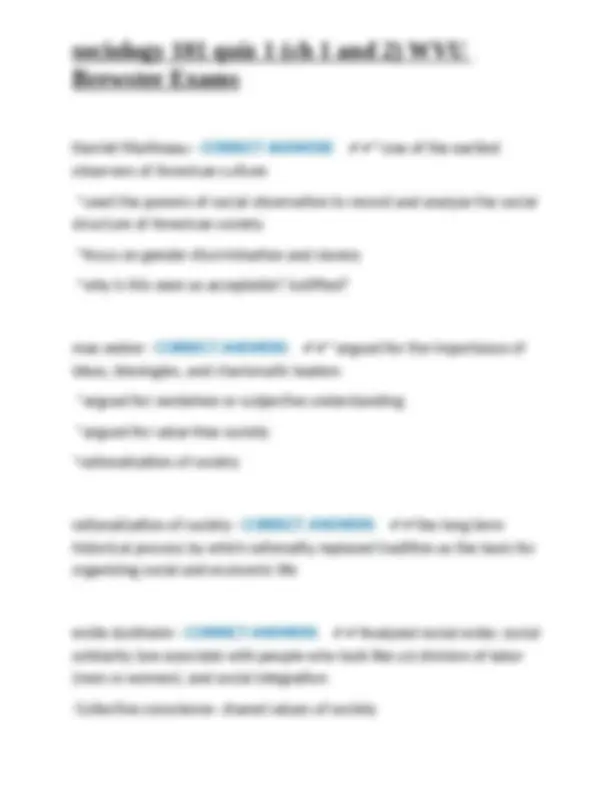
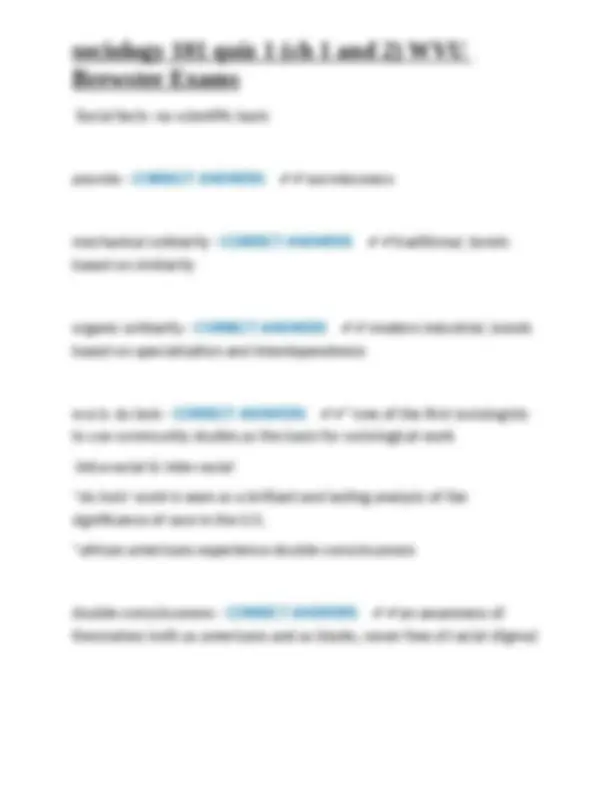
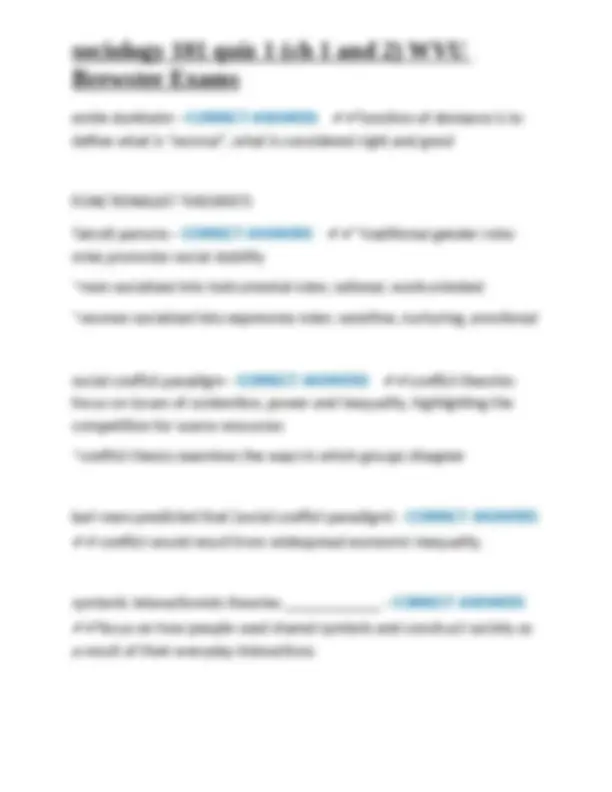
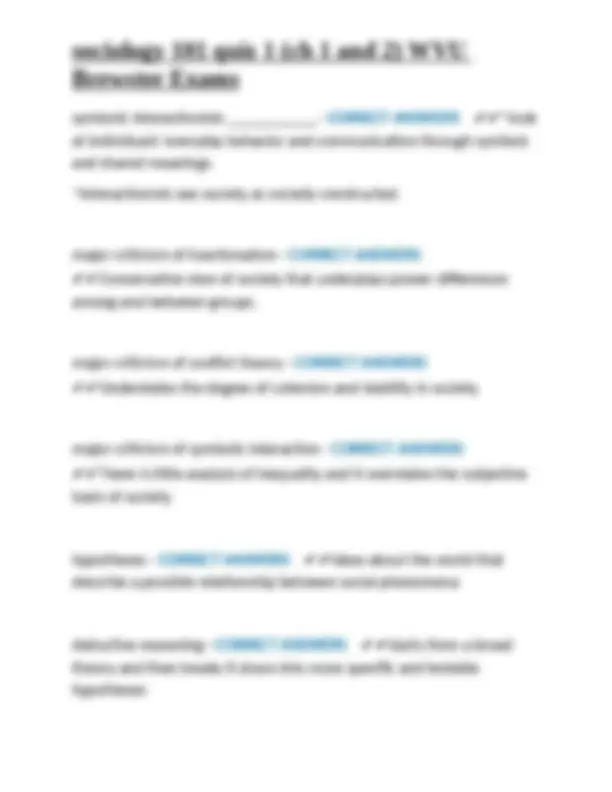
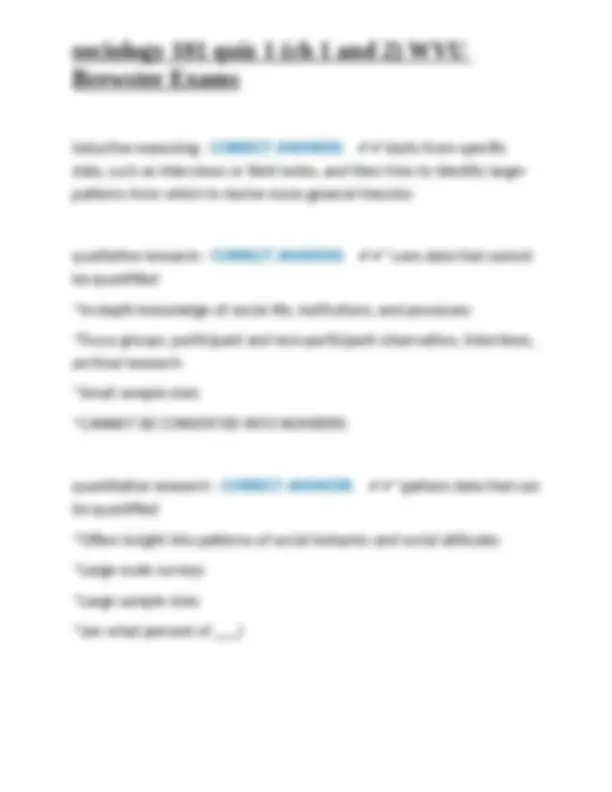
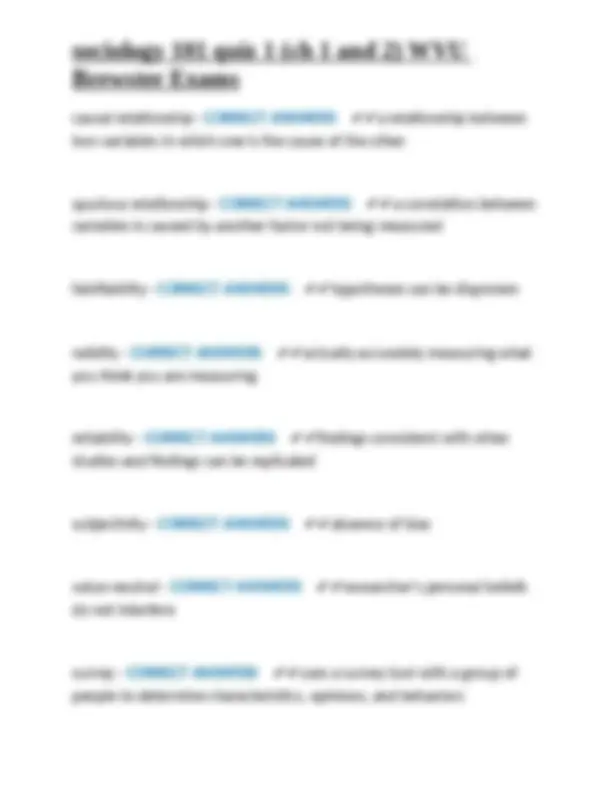
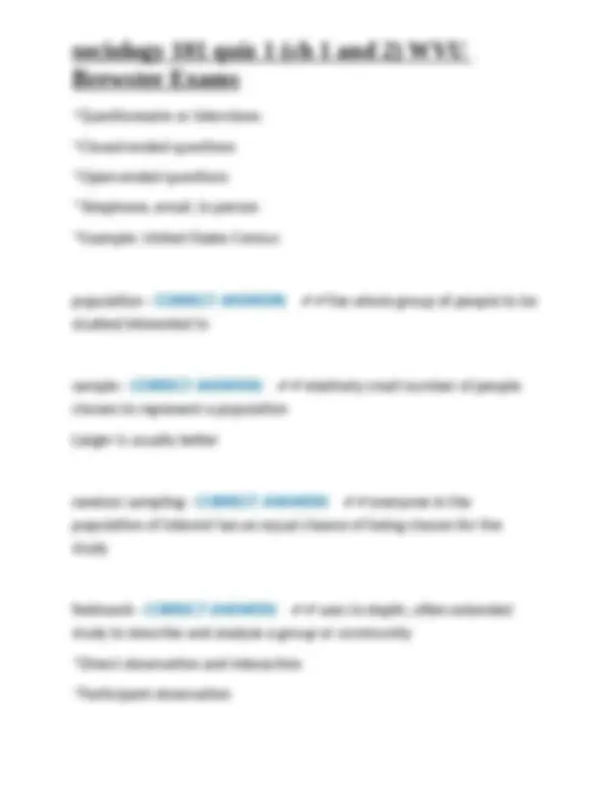
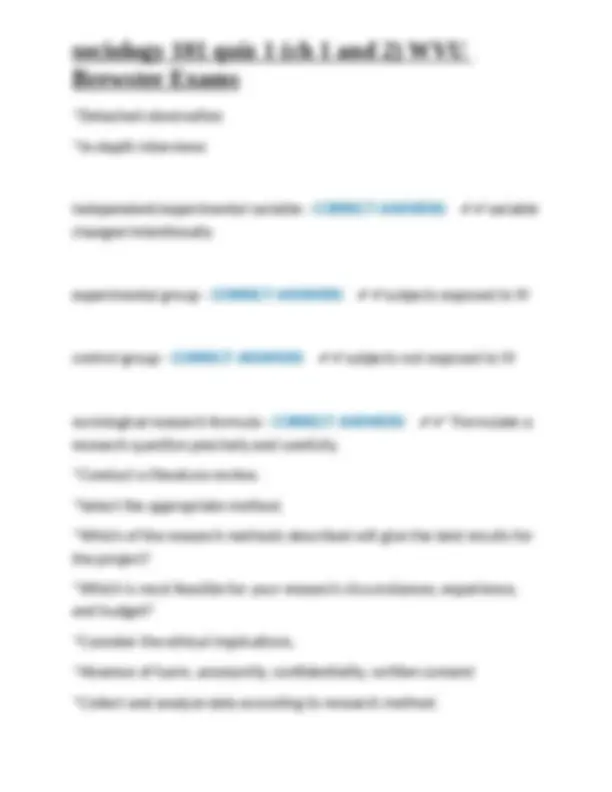


Study with the several resources on Docsity

Earn points by helping other students or get them with a premium plan


Prepare for your exams
Study with the several resources on Docsity

Earn points to download
Earn points by helping other students or get them with a premium plan
Community
Ask the community for help and clear up your study doubts
Discover the best universities in your country according to Docsity users
Free resources
Download our free guides on studying techniques, anxiety management strategies, and thesis advice from Docsity tutors
sociology 101 quiz 1 (ch 1 and 2) WVU Brewster Exams
Typology: Exams
1 / 16

This page cannot be seen from the preview
Don't miss anything!










sociology - CORRECT ANSWERS ✔✔scientific study of human social relationships, groups, societies; the systematic study of the relationship between the individual and society and of the consequences of difference common sense often __________ - CORRECT ANSWERS ✔✔distorts reality, often contradictory, common sense perceptions change over time, based on myths and misconceptions sociological imagination - CORRECT ANSWERS ✔✔the ability to grasp the relationship between individual lives and the larger social forces that shape them; Relationship between personal troubles and public issues; WHERE BIOGRAPHY AND HISTORY INTERSECT; ex: american dream, poverty agency - CORRECT ANSWERS ✔✔the ability of individuals and groups to exercise free will and to make social change whether on a small or large scale structure - CORRECT ANSWERS ✔✔patterned social arrangements that have an effect on agency; our choices are enabled or constrained by this; reciprocal relationship
critical thinking - CORRECT ANSWERS ✔✔the ability to evaluate claims about the truth by using reason and evidence. We frequently accept things as "true" because they are familiar, feel right, or are consistent with our beliefs. steps in critical thinking - CORRECT ANSWERS ✔✔Be willing to ask any questions, no matter how difficult. Think logically and be clear. Back up your arguments with evidence. Think about the assumptions and biases- including your own- that underlie all studies. Avoid anecdotal evidence. Be willing to admit when you are wrong or uncertain about your results. sociological thinking is rooted in ___________ - CORRECT ANSWERS ✔✔rooted in 4 interrelated historical developments:
Harriet Martineau - CORRECT ANSWERS ✔✔*one of the earliest observers of American culture *used the powers of social observation to record and analyze the social structure of American society *focus on gender discrimination and slavery why is this seen as acceptable? Justified? max weber - CORRECT ANSWERS ✔✔argued for the importance of ideas, ideologies, and charismatic leaders *argued for verstehen or subjective understanding *argued for value-free society *rationalization of society rationalization of society - CORRECT ANSWERS ✔✔the long term historical process by which rationality replaced tradition as the basis for organizing social and economic life emile durkheim - CORRECT ANSWERS ✔✔Analyzed social order, social solidarity (we associate with people who look like us) division of labor (men vs women), and social integration Collective conscience- shared values of society
Social facts- no scientific basis anomie - CORRECT ANSWERS ✔✔normlessness mechanical solidarity - CORRECT ANSWERS ✔✔traditional, bonds based on similarity organic solidarity - CORRECT ANSWERS ✔✔modern industrial, bonds based on specialization and interdependence w.e.b. du bois - CORRECT ANSWERS ✔✔*one of the first sociologists to use community studies as the basis for sociological work Intra-racial & inter-racial *du bois' work is seen as a brilliant and lasting analysis of the significance of race in the U.S. *african americans experience double-consciousness double-consciousness - CORRECT ANSWERS ✔✔an awareness of themselves both as americans and as blacks, never free of racial stigma)
patterns of interaction within families functionalism - CORRECT ANSWERS ✔✔society is a complex system of interdependent parts that work together to ensure a society's survival *focuses on consensus and cooperative interaction in social life, emphasizing how different elements that make up a society's structure contribute to its overall operations functions - CORRECT ANSWERS ✔✔are purposes and activities to meet different needs that contribute to a society's stability manifest functions - CORRECT ANSWERS ✔✔are the recognize and intended consequences of social phenomena latent functions - CORRECT ANSWERS ✔✔are largely unrecognized and unintended consequences dysfunctions - CORRECT ANSWERS ✔✔are inhibiting or disrupting to the working of a system as a whole FUNCTIONALIST THEORISTS
emile durkheim - CORRECT ANSWERS ✔✔function of deviance is to define what is "normal", what is considered right and good FUNCTIONALIST THEORISTS Talcott parsons - CORRECT ANSWERS ✔✔*traditional gender roles roles promotes social stability *men socialized into instrumental roles; rational, work-oriented *women socialized into expressive roles: sensitive, nurturing, emotional social conflict paradigm - CORRECT ANSWERS ✔✔conflict theories focus on issues of contention, power and inequality, highlighting the competition for scarce resources *conflict theory examines the ways in which groups disagree karl marx predicted that (social conflict paradigm) - CORRECT ANSWERS ✔✔conflict would result from widespread economic inequality. symbolic interactionists theories ____________ - CORRECT ANSWERS ✔✔focus on how people used shared symbols and construct society as a result of their everyday interactions
inductive reasoning - CORRECT ANSWERS ✔✔starts from specific data, such as interviews or field notes, and then tries to identify larger patterns from which to derive more general theories qualitative research - CORRECT ANSWERS ✔✔*uses data that cannot be quantified *In-depth knowledge of social life, institutions, and processes *Focus groups, participant and non-participant observation, interviews, archival research *Small sample sizes CANNOT BE CONVERTED INTO NUMBERS quantitative research - CORRECT ANSWERS ✔✔gathers data that can be quantified *Offers insight into patterns of social behavior and social attitudes *Large-scale surveys *Large sample sizes *(ex: what percent of ___)
basic research - CORRECT ANSWERS ✔✔Research that has as its primary goal to describe some aspect of society and advance our understanding of it applied research - CORRECT ANSWERS ✔✔Research that has as its primary goal to directly address some problem or need public sociology - CORRECT ANSWERS ✔✔The effort to bring the findings of both basic and applied sociological research to a broader nonacademic audience the limits of everyday thinking - CORRECT ANSWERS ✔✔*Unquestioned trust in authorities *Unquestioned acceptance of "common sense" *Unquestioned acceptance of traditional beliefs *Generalizations based on personal experience *Reliance on selective observation *Biased observation and interpretation common wisdom - CORRECT ANSWERS ✔✔Widely held beliefs or perceptions that people repeat are often inaccurate and unsupported by sociological research
causal relationship - CORRECT ANSWERS ✔✔a relationship between two variables in which one is the cause of the other spurious relationship - CORRECT ANSWERS ✔✔a correlation between variables is caused by another factor not being measured falsifiability - CORRECT ANSWERS ✔✔hypotheses can be disproven validity - CORRECT ANSWERS ✔✔actually accurately measuring what you think you are measuring reliability - CORRECT ANSWERS ✔✔findings consistent with other studies and findings can be replicated subjectivity - CORRECT ANSWERS ✔✔absence of bias value-neutral - CORRECT ANSWERS ✔✔researcher's personal beliefs do not interfere survey - CORRECT ANSWERS ✔✔uses a survey tool with a group of people to determine characteristics, opinions, and behaviors
*Questionnaire or interviews *Closed-ended questions *Open-ended questions *Telephone, email, in person *Example: United States Census population - CORRECT ANSWERS ✔✔the whole group of people to be studied/interested in sample - CORRECT ANSWERS ✔✔relatively small number of people chosen to represent a population Larger is usually better random sampling - CORRECT ANSWERS ✔✔everyone in the population of interest has an equal chance of being chosen for the study fieldwork - CORRECT ANSWERS ✔✔uses in-depth, often extended study to describe and analyze a group or community *Direct observation and interaction *Participant observation
*Publish results in an academic journal, book, newspaper, documentary, or share at a conference.